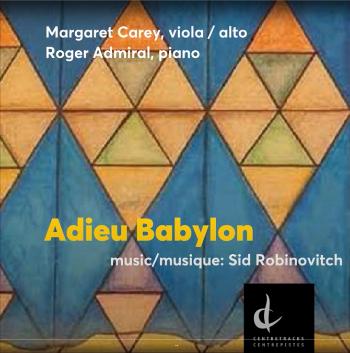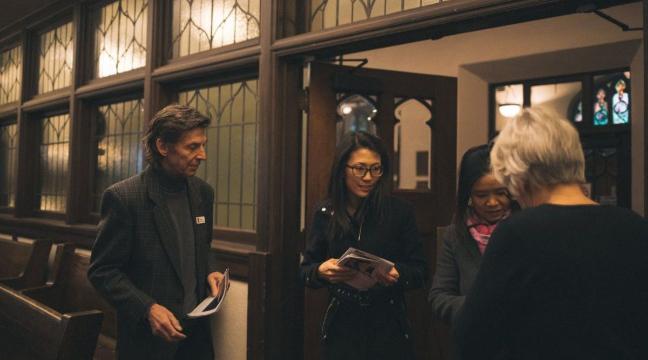What could musicians do in Bach's era that we can't? Aisslinn Nosky discusses with Anne Manson
Concert musicians enjoy advances in kinesiology, materials science, and other technologies in the same way athletes do. Violin strings, as with athletic shoe-laces, are now less likely to break during especially strenuous moments, while computer imaging helps illustrate the most effective ways of executing a tremolo or slap-shot.
All the more reason to look back upon the achievements of Bach and Stradivarius in the same we do the construction of the pyramids and Stonehenge — as wonders that defied the constraints of their eras. "Bach was one of the greatest keyboardists, but he was also a fantastic violinist," says violinist Aisslinn Nosky. "Even so [Bach's sonatas and partitas for solo violin] are so difficult, it's hard for professional violinists today to manage it... So I don't see how he would have had time to practice it for himself!"
Aisslinn marvels generally at the craft and gumption of Baroque-era musicians: "Considering they performed without electricity, without central heating, probably in the dark with instruments that might not have been maintained that easily or that well... you think, well, I'd better stop making excuses for myself!"
Aisslinn is, of course, MCO's Guest Artist in Residence as well as being one of Canada's top baroque violinists. She was to perform Bach with us at our now cancelled May concert. On the upside, you can hear her perform Bach's E Major partita in this video, and enjoy more of her discussion with Anne Manson about how the techniques and skills of baroque-era musicians compared with musicians of today. And be sure to check out this Spotify playlist, curated with help from Aisslinn Nosky, of repertoire that was programmed for our May concert.
The oboe as snake charmer: Caitlin Broms-Jacob in conversation with Kevin Lau and Anne Manson
From Bugs Bunny to the Nutcracker — why are snake charmers so often depicted as playing an oboe? Last week, MCO oboist Caitlin Broms-Jacobs spoke with MCO Music Director Anne Manson and composer Kevin Lau about an oboe concerto Kevin's composing for her and the MCO. In this conversation, she also talked about three common associations popular culture and classical music have with this 'dark, seductive' instrument: oboe as snake charmer, oboe as shepherd, and oboe as toy trumpet.
Desiree Abbey performs David Eby's Celtic Passage
Desiree Abbey, who frequently acts as the MCO's principal cellist, performs David Eby's lovely Celtic Passage in moving tribute to the victims of the recent tragedy in Nova Scotia.
Jurassic Park, cluster chords, and Writ in Water: Kevin Lau in conversation with Anne Manson
In March 2019, the MCO premiered Canadian Kevin Lau's gorgeous Writ in Water. We were so looking forward to reprising this work at our April 2020 concert, but unfortunately the concert was suspended due to the COVID-19 breakout. On the upside, Kevin is now the MCO's Composer-in-Residence, and as such will be premiering a new concerto with us in our 20-21 season.
In this conversation, Kevin digs into the the score of Writ in Water, analyzing it against the soundtrack of the actual performance, as well as talking movies and inspirations. Click here to watch; click here to hear the full verison of the performance. He also discusses his new concerto featuring oboist Caitlin Broms-Jacobs — but we've saved that for another video, to be released soon!
Experience more of our April concert digitally by checking out this Spotify playlist curated by Anne based on this concert's repertoire and this Interactive Learning Guide developed for the same concert.
Canada's great percussionist Victoria Sparks
Victoria Sparks performs Evelyn Glennie's poignant, moving Little Prayer in tribute to frontline healthcare workers at our partners at Artists in Healthcare.
Classic 107's biweekly broadcasts of MCO performances
The MCO is very pleased to work with our good friends at Classic 107 to deliver this initiative: on Sunday afternoons, beginning at 2PM, attend a radio concert broadcast of a classic MCO performance from the archives. Brought to you by the Winnipeg Foundation, we will continue the feature every second Sunday. Though we are not able to gather in person, we are able to gather on the radio airwaves for a physically-distanced concert. The next broadcast concert will be 2PM Sunday, 10 May on 107.1 FM.
Some musical offerings from MCO's friends
A radio channel from the future. A sardonic selfie museum..." Cluster XI Digital Edition launches 7.30 PM CST, 1 May, and contains hours of media, from audio pieces to video game to recipes and more. Check it.

You'll know Margaret Carey as a regular MCO violist, as you'll know the just-mentioned Sid Robinovitch as a longtime MCO collaborator. Check out Margaret's recently released recording of Sid's work.

Watch Ivan Hughes' film Concerto, an intimate portrait of the MCO and its players, for free
Victoria Sparks coaxing gorgeous sounds from the marimba and vibraphone; Sid Robinovitch’s witty, pensive, and beloved percussion concerto; pieces by Mozart Sr. and Jr – we’re happy that these and other elements of our suspended 22 April concert (Moderns, Mozarts, and Mozart Imposters) can still be experienced online.
Last week, the MCO released a video conversation between Victoria and MCO Music Director Anne Manson where, via Zoom, they discussed Sid’s concerto and how musicians coping and staying creative right now. Hear an excerpt from that concerto by watching the video here. We also suggest that you check out this Spotify playlist curated by Anne based on the repertoire for our 22 April concert and this Interactive Learning Guide developed for the same concert. While created for K-12 school groups, the guide is also perfect for the sort of inquisitive music-lover curious about, for instance, the real identity of the composer behind W.A. Mozart’s so-called Symphony No. 3 in E-flat Major. (Hint: it’s not Wolfgang’s dad.)
This week, we’re delighted to provide you with free access (for the next month) of Ivan Hughes’ film Concerto about Victoria Sparks’ premiere with the MCO of Sid’s percussion concerto. As well as offering an intimate portrait of the MCO and its friends, the film tracks the dramatic experience of premiering a concerto as Victoria memorizes her part, overcomes fears and faces poignant adversity, and prepares to take her place at the front of the stage.
MCO cellist Desi Abbey performs from home
Below Desiree Abbey, who frequently serves as the MCO’s principal cellist, delivers a touching thank you to healthcare workers and our partners at Artists in Healthcare, to whom the ensuing performance is dedicated. The performance, of Ligeti’s Sonata for Solo Cello, continues to pull at our heartstrings: it expresses all the secret longing Ligeti felt for the cellist for whom it was written – one Annuss Virány who, apparently being unaware of Ligeti’s romantic feelings, merely thanked the young composer for the gift and never performed it! Love hurts sometimes, bro.
The MCO thanks and misses our volunteers
Being a relatively small organization, MCO has always relied on our team of enthusiastic and multi-skilled volunteers. They provide valuable assistance with special events, office work and ushering at concerts. Quite often, volunteers are the first people from the MCO that concert-goers meet and as such, play a vital role in enhancing their concert experience. Our volunteers are also a tremendously fun group of people to work with!
These are challenging times for everyone and we have all had to adapt to the changes in our daily lives and temporary halt of activities and events that we enjoy in our community. As we continue to work and plan for the future, the MCO staff continues to be both heartened and strengthened by the support of our volunteers.
It is only fitting that as this is National Volunteer Week, we take the opportunity to acknowledge this special group of people who are so generous with their time and talents. MCO is indeed fortunate to have such wonderful friends. We miss you and look forward to seeing you all again soon!
Take care and stay safe.
— Elise Anderson, MCO House Manage

Victoria Sparks performs Evelyn Glennie and more in this special conversation with Anne Manson
There’s something bittersweet about watching Winnipeg percussionist Victoria Sparks perform the two percussion concertos she visits in the video below. One concerto is by Alexina Louie and the other, Sid Robinovitch, and Victoria was to perform them with us this season at our March and April concerts respectively. Very sadly, the concerts are, of course, suspended due to the COVID-19 outbreak. Yet what a pleasure to hear her play and discuss excerpts from these fascinating works in this Zoom chat with MCO Music Director Anne Manson.
Surely no member of the orchestra masters and manages as many instruments, doohickeys, and baubles as the percussionist, and here Victoria takes us through the arsenal of melody- and rhythm-makers – marimba, vibes, sizzle, gongs, bowls – deployed in Louie’s concerto. After that we revisit Sid Robinovitch’s sparkling, pensive, and witty percussion concerto, the sleeper hit of our 2015-16 concert season which we looked forward to reprising at our 2020 April concert.
Victoria also talks about how musicians are coping and staying creative amid this moment of social distancing, and as finale performs Evelyn Glennie’s gorgeous percussion chorale The Little Prayer. “With all this going on, I just thought I need to play something that just makes me feel calm. And this piece always just makes me feel centred and calm,” says Victoria. “It’s a piece I’ve been playing for a long time, but I keep coming back to it. It just makes me feel better every time I play it.”
MCO donor and friend Roger Groening reflects on his father's lifetime of music appreciation
My dad, Edd Groening, was 14 when he persuaded my grandfather to buy him a violin. A bow was not forthcoming, so he made his first one from horsehair, extracted from one of the horses on the farm. My dad practiced his violin with joyful dedication; never tiring, it seemed, of playing it. He learned other instruments as well, and successfully encouraged all his children to play and enjoy music.
Yet my father’s violin was likely his favourite lifelong companion, and he played it for over 80 years. For much of that time, he was an active performer with community orchestras, as well as with his church, wife of 60 years, friends, and family. Making music as a family became a critical part of any visit. We'd play together at his care facility, and even during the last year or so, when my father could no longer play, he would sometimes still ask for his violin. The music resounded in his mind, though his body could no longer perform the sensitive physicality the violin demands.
When my father moved to Winnipeg at the age of 90, we attended MCO concerts with one another. I would purchase season tickets and for about a decade, he was my date. We would sit together on the north balcony, second row from the front rail. Sometimes, even in the winter, we would walk back to his residence after the performance, discussing aspects of the concert. He was 103 at the last MCO concert we attended.
Years of musical appreciation were nurtured in good measure by the inspiring performances we shared at the MCO. My relationship with my father was informed by our mutual interest in music. While we shared other interests too, music was the best teacher. Through it we truly learned to listen to each other. I am grateful to my father for the gift of musical appreciation, and to the MCO for nurturing that gift.
— Roger Groening
Mozart and Bach from one sanctuary to another
From calculus to King Lear, more than a couple of civilization’s great achievements were reputedly produced under quarantine (with a little help from patrons, no doubt). From the many provincial towns where he lived and worked, J.S. Bach appears to have escaped the epidemics that wracked parts of Europe in the early 18th century. But he was clearly another great artist who knew something about working under conditions of isolation.
Fitting then that Karl Stobbe has chosen the metaphorically potent works of Bach, specifically his Sonatas and Partitas for violin, as the repertoire for a series of online performances he’s presenting from his home studio. While obscure for over a century, the six gorgeous, melancholic pieces now resonate throughout the world. This is lonesome music for the ages.
“This is just me in my living room, borrowing a few microphones from friends, no editing,” says Karl. “It's scarily honest … But I guess that’s what our world is right now: fragile and honest.”
While peeking down the YouTube rabbit-hole, you'll probably want to check out another performance featuring Karl. This one, re-released today, is from the MCO's February 2015 concert at Westminster Church and is of Mozart's 40th symphony.
Listen to this instant classic: Dinuk Wijeratne and MCO's October 2019 premiere of Gajaga Vannama
When it’s one’s job to promote concerts, as it is mine, I think one actually struggles a little harder to describe favourite concerts. How not to resort to the hyperbole of adspeak when talking about an experience as memorable as our October 2019 concert with pianist-composer-conductor Dinuk Wijeratne? Of course, if you follow our promotional material, you’ll hear us conveying how all our concerts are the best, though this one was for me among the bestest. So I'm very happy to say that the MCO has just released a live recording of two pieces from this concert, which you can hear here.
The concert’s centrepiece was the world premiere of Gajaga Vannama, a piano concerto commissioned by the MCO and composed, conducted, and performed on by Dinuk. It's the second piece in our recording. Western-classical-meets-traditional-Sri-Lankan-music is, simplistically put, how Dinuk’s engaging program note describes it. One audience member told me they anticipated the sort of experiment that, at the very least, would delight multiculturally-minded arts administrators. Another audience member, more familiar with Dinuk’s work, said they were not in the least bit surprised when the performance was met with one of most resounding standing ovations in recent MCO memory.
As I accompanied him to an interview the day before the concert, Dinuk – articulate, friendly, and conversational — told me that he’s influenced by the rhythms of popular music. Gajaga Vannama dances in a way that few classical pieces do, and its most rhythmically infectious stretch is the ‘Konnakol’ section near the end. Probably the closest Western comparison to the rapid-fire recitation style of Konnakol is rapping in hip-hop, though there’s little in mainstream rap I’ve heard that nears the rhythmic complexity of Konnakol with its wild syncopation and kaleidoscopically-shifting meters.
At a moment where increasingly institutionalized support for diversity in the Canadian arts is also met with increasingly brazen hostility from some corners, works like Gajaga Vannama illustrate a lesson from the Renaissance no less genuine for being a cliché. At a certain point, even great traditions grow stagnant if they are not brought into interaction with the traditions of different cultures, and may flourish if they are. I’m sure the polymathic Dinuk, a Renaissance man, did not compose Gajaga Vannama in order to make a point, much less teach Canadians a lesson. Though what an inspiring example it sets!
— Conrad Sweatman
Listen to Spotify playlists inspired by our March and April concerts
While the MCO's 19/20 season is, very sadly, suspended, you can still experience much of the concert programs by checking out playlists we've shared to the MCO's Spotify page. Featured content follows
Cluster Fest Playlist
A playlist curated by the Cluster Fest inspired by their March 2020 festival, which was to feature two performances with the MCO.
Moderns, Mozarts, and Mozart Imposters
A playlist curated by MCO Music Director Anne Manson and inspired by the MCO's 22 April concert, entitled Moderns, Mozarts, and Mozart Imposters. You'll hear works by W.A. Mozart, his father Leopold Mozart, and Carl Freidrich Abel whose arguably most famous work was long misattributed to Mozart Jr. The concert was also to feature works by a number of contemporary composers, including Julian Grant, Kevin Lau, and Sid Robinovitch. Where we've been able to find their work on Spotify, Anne has selected some interesting pieces for the playlist.
Never used Spotify before? Check out this handy guide.
Consider donating your unused concert tickets
With so many arts groups being unable to avoid suspending their 19-20 seasons, many audience members are donating back their unused tickets and receiving a charitable tax receipt. While everyone feels the strain of the current situation, gestures of this sort are greatly appreciated at a time of considerable financial uncertainty for artists and presenters.
The MCO is extremely grateful for their loyal supporters, and thanks everyone who has donated their tickets. Please note you may also exchange your tickets for a concert next season or receive a refund. No ticket exchange fee applies. If you prefer a refund or exchange for a given concert ticket, we ask that you please contact us no later than the date of the concert, in accordance with the MCO’s regular ticket policy. Please call the MCO at 204-783-7377 or email us, and someone will get back to you.
We look forward to connecting with you online and over the phone in the coming months, and to sharing the joy of live music with you next season
